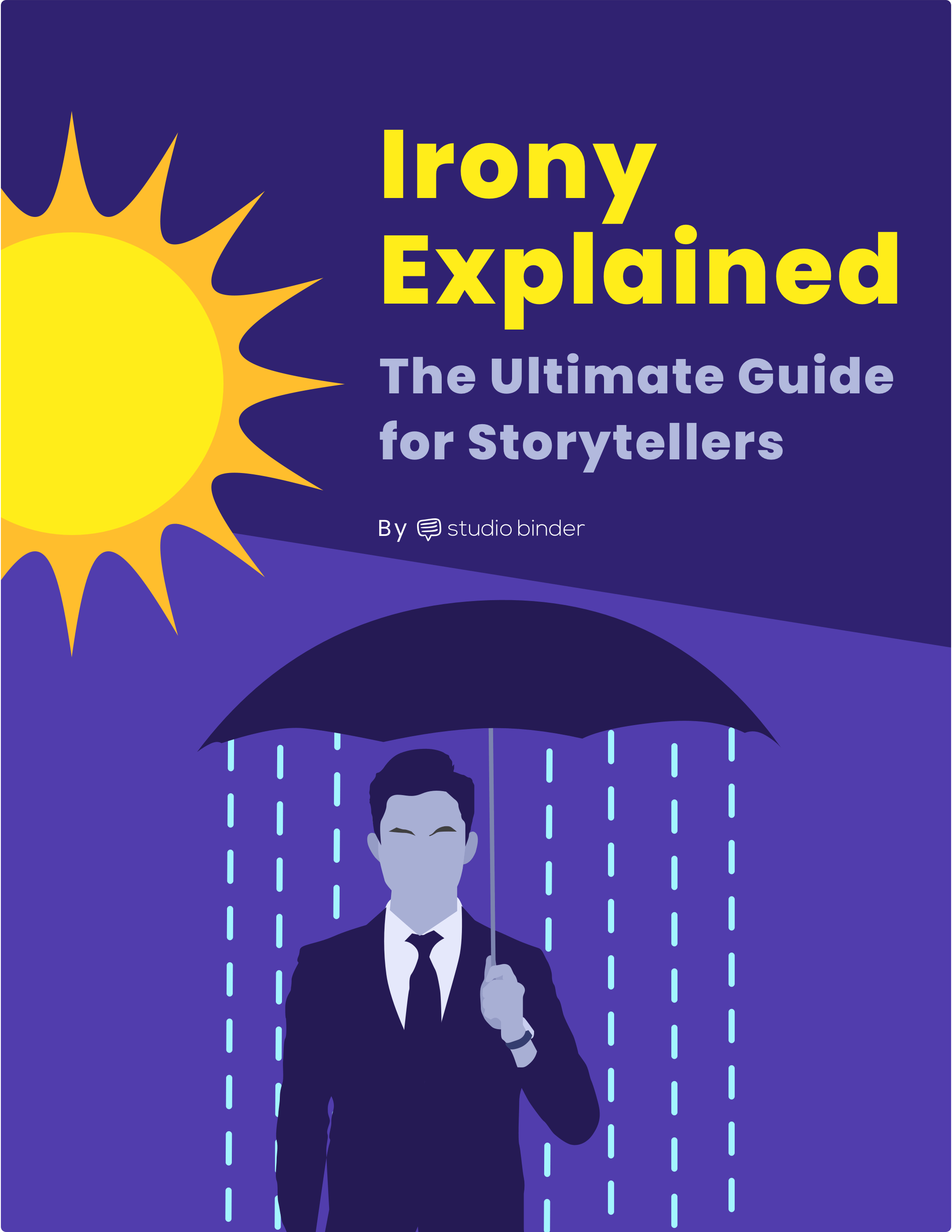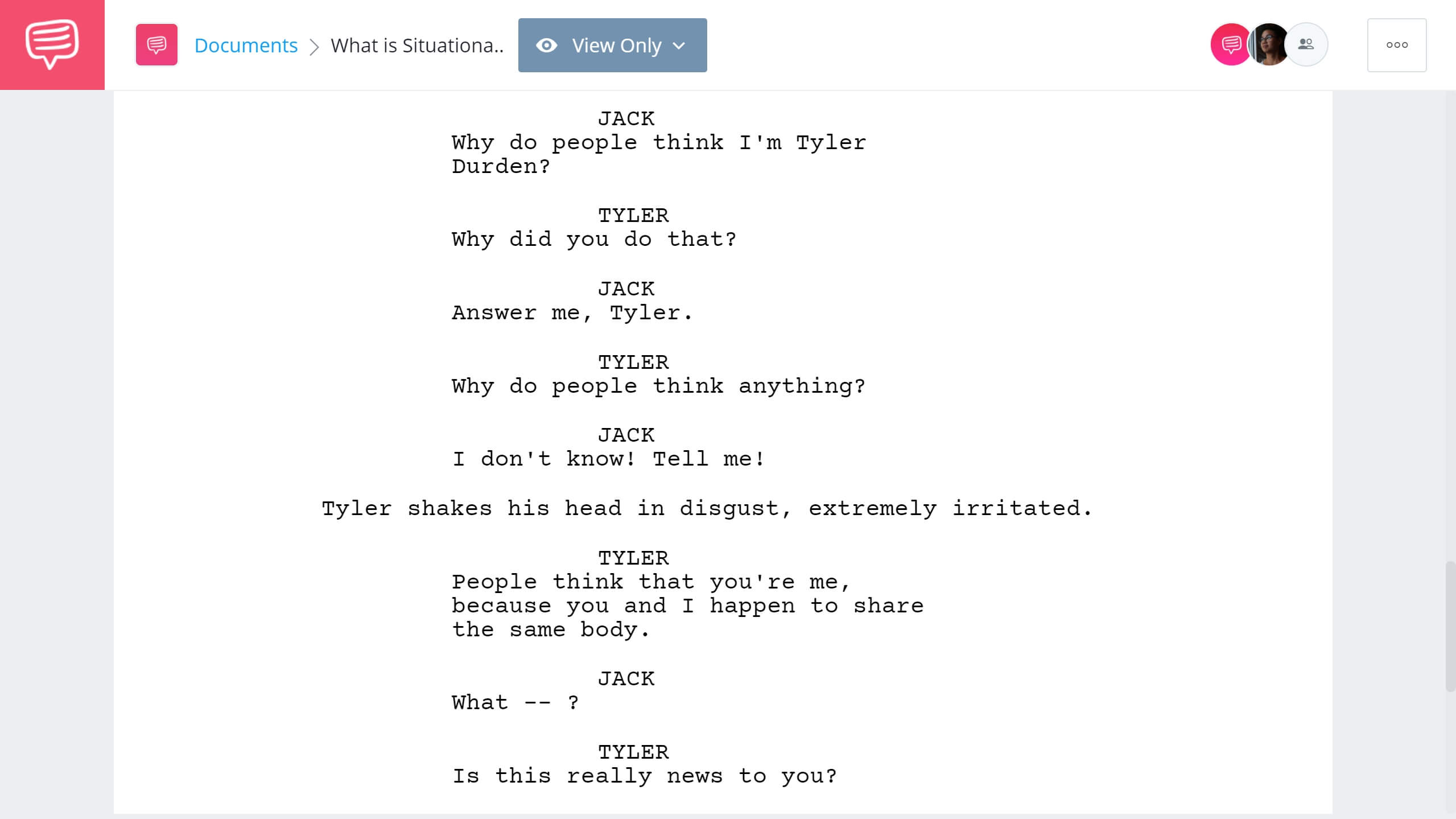Situational irony is a broad term with near-endless applications. At a fundamental level, every story has some aspect of situational irony – which means that it’s a key component of storytelling. But what is situational irony? We’re going to define situational irony by looking at situational irony examples in film and TV. By the end, you’ll understand how situational irony works – and how d you’ll be able to add intrigue and complexity to your storytelling.
What Does Situational Irony Mean?
Situational irony meaning explained
Situational irony is a very straight-forward concept – but it can be tricky to weave it into stories. Below, we'll see this concept in action with some examples from film & TV but let's begin with a quick situational irony definition.
Define Situational Irony
What is situational irony?
Situational irony is when the opposite of what we expect to happen, happens. It can be as simple as bringing an umbrella outside only to find the sun shining. Or it can be as dramatic as revealing the killer to be the least likely suspect. It is the ultimate curveball to throw your audience — and, when done well, it can be supremely satisfying. Who doesn't love a shocking twist?
Subtypes of situational irony
- Cosmic irony (Irony of Fate)
- Poetic irony (Poetic justice)
- Structural irony
- Historical irony
Situational Irony Definition and Examples
Types of irony
Situational irony vs other ironies
Of course, situational irony isn’t the only kind of irony out there. Here’s a brief refresher on the other two main types of irony, and how they’re different from situational.
Situational irony vs dramatic irony
Dramatic irony refers to scenarios where the audience knows something the characters don’t. This type of irony is used all the time in movies and literature since it is very effective at building tension.
Think of a horror movie where the audience knows a monster is lurking behind the bedroom door, and the protagonist is pontificating as to whether or not they should enter. The viewer will be on the edge of their seat.
But dramatic irony doesn’t have to rely on subverting our expectations. In that example, we’re expecting the monster to be behind the door– that is not where the irony is coming from.
Situational irony vs verbal irony
Verbal irony is when you say something but mean something else. You’re planning on going to the beach, see storm clouds on the horizon, and say, “Great, rain! Just what we needed for a beach day.” You’re being ironic.
This isn’t situationally ironic, however, because this isn’t playing on our expectations.
Now that we have a firm grasp on verbal, dramatic, and situational irony, let’s look at some examples of the latter.
Situational Irony Examples Literature
Examples of situational irony
Situational irony has played an important role in countless works of literature, film, and art. Looking at a few examples will allow us to understand how and why.
Situational irony in literature
- O. Henry’s The Gift of the Magi uses situational irony as its key plot point. A wife sells her hair to buy a chain for her husband’s watch, while her husband sells his watch to buy her a comb.
- In The Story of an Hour, Louise is told her husband is dead. But despite the morbid circumstance, and the fact Luise had no ill will towards her husband, she feels an overwhelming sense of joy. But when her husband returns alive, she suffers a heart attack and dies. This is an example of situational irony because it’s the opposite of what we’d expect from a grieving widow.
- In Macbeth, the title character murders the king as a means to an end. But Macbeth soon finds out that he has to keep killing in order to protect his throne. This is an example of situational irony because the situation was meant to put an end to Macbeth’s killings, but in reality, it only exacerbated them.
Situational irony in film
- In American Psycho, Patrick Bateman confesses to committing a series of murders – but is laughed off. This is an example of situational irony because we expect he’s going to be punished for his crimes but he isn’t.
- The Sixth Sense uses situational irony to deliver an iconic plot twist. Malcolm is a psychologist helping a boy who claims he can see dead people. In the end, it is revealed that Malcolm himself is dead.
- Harry Potter frequently uses situational irony. Perhaps the most potent example is Snape, who is presented as a villain, but ends up being one of Harry’s closest allies.
As you can probably tell, situational irony can take a variety of forms. Let’s look at some of its subtypes.
Different kinds of situational irony
Types of situational irony
The various kinds of situational irony all play on the core idea of subverting audience expectations. But they all do it in different ways.
Cosmic irony
Cosmic irony is defined by the inclusion of a supernatural twist. We still have a situation in which reality and expectation are different but there is an additional element — a "higher power" is involved.
This higher power could be God, the Universe, fate, or even aliens. Cosmic irony is also known as "irony of fate," which might help give you an idea of how it all works.
In Monty Python’s The Life of Brian, the title character falls off of a tall building, but is rescued by an alien ship.Here, the Pythons largely satirized cosmic irony. Many instances of cosmic irony devolve into deus ex machina, aka a hopeless situation that’s resolved in a contrived way – but this example succeeds due to its use of satire.
Poetic irony
Poetic irony occurs when a crime or transgression is unexpectedly resolved positively, often due to a ‘twist of fate.’
In The Killing, the heist of a horse racetrack is perfectly planned and executed. In the end, karma visits Johnny Clay when he is mere minutes away from escape. While waiting for the plane, a dog runs onto the tarmac and the driver of the luggage cart swerves. Johnny’s suitcase falls and $2 million in cash gets sent flying in every direction.
Structural irony
Structural irony occurs when the perspective of an unreliable narrator or naive protagonist is different from the reality of the situation.
In some cases, the unreliable narrator may simply be lying to the audience; or they may have convinced themselves of a faulty truth. Either way, when the entire story is built around this ignorance or deception, you get structural irony.
Spoiler alert: perhaps no movie gives us a narrator more clearly unreliable than Fight Club. Let’s check out the Fight Club screenplay, which we imported into StudioBinder’s screenwriting software, to see where the narrator learns he’s been living a lie.
Situational Irony is Exposed in Fight Club
In this scene, the narrator realizes he’s Tyler Durden. Everything up to this point has been warped through the lens of an unreliable narrator. As such, we can say Fight Club is an example of structural irony.
Historical irony
Historical irony has more to do with actual history than fiction but can still be used for deep and profound reasons in your storytelling.
Historical irony occurs when hindsight provides an ironic perspective on an action or stance made in the past. Hindsight is 20/20, right?
At the end of The Social Network, Mark Zuckerberg finds himself alone, reaching out to someone he once had a connection with — perhaps the only person he ever had a chance of connecting to.
Now that we've covered what is situational irony and how to write it, check out our FREE ebook covering the types of irony, examples, and how writers wield it.
Free downloadable bonus
FREE Download
Ultimate Guide to Irony
Irony is an essential literary device that all writers should master. Download our FREE e-book to get in-depth explanations and examples on topics like the major types and sub-types of irony, and the myriad of ways writers can use it to enrich their storytelling.

UP NEXT
Dive deeper into irony
We've covered the basics of situational irony but there is so much more to learn. If there is a particular form of irony you want to explore further, just follow the navigation below. Each one of these subtypes of irony belongs in every writer's toolkit.
Types of Irony
Read a summary of the various types of irony, or dive into the specifics below.


